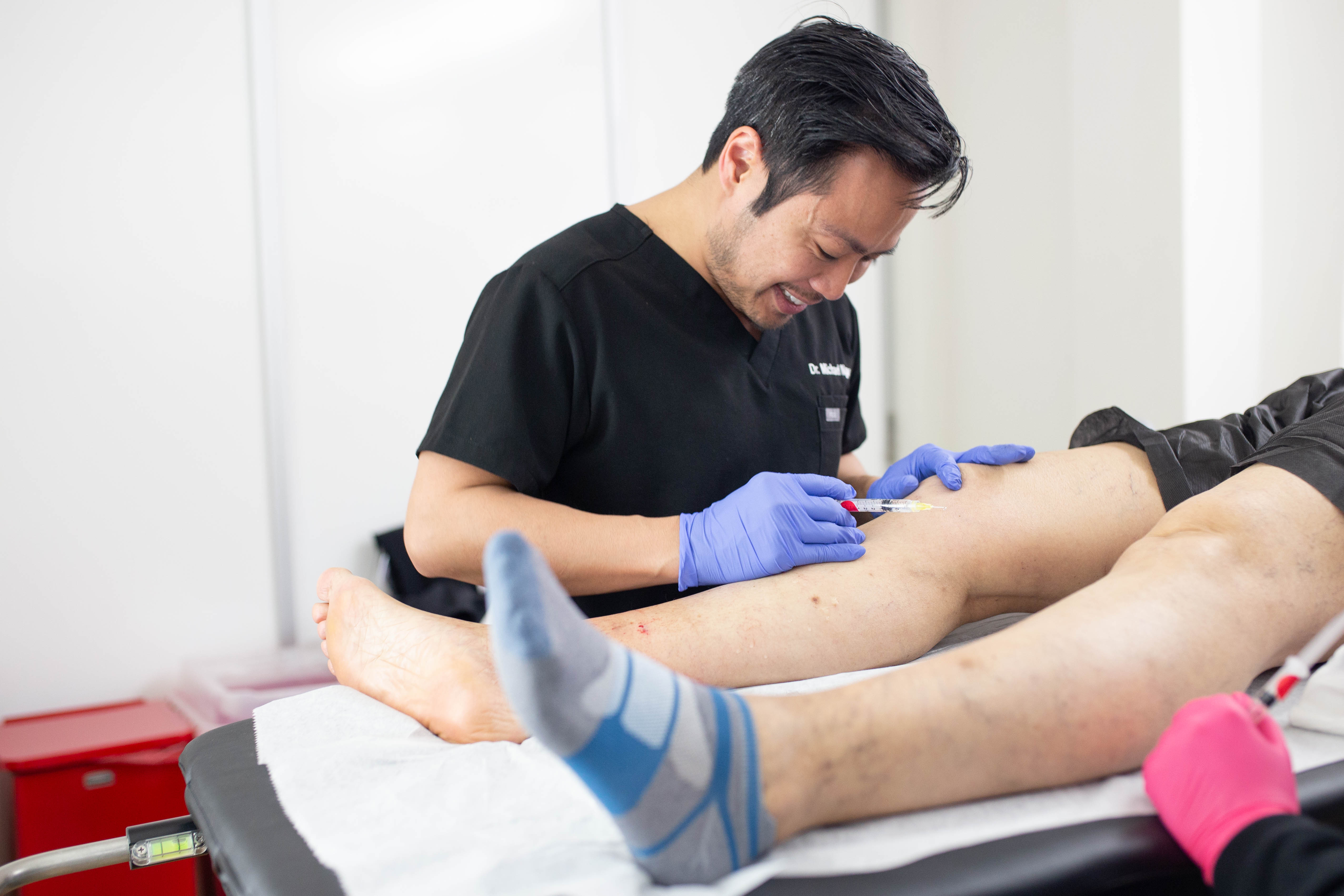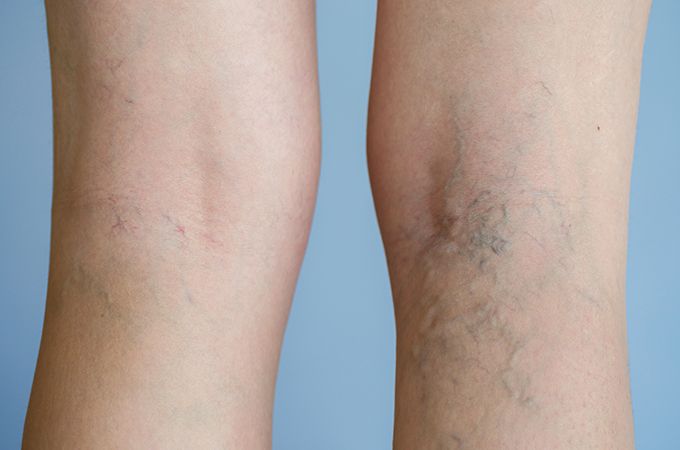Our varicose vein doctor in New Jersey discusses chronic venous insufficiency, symptoms of vein disease, vein treatments, and more.
Dr. Sareh Rajaee and Dr. Todd Kobrinski are the best vein specialists in New Jersey, currently serving as the vein doctors at Vein Treatment Clinic’s offices in Clifton and Paramus.
Dr. Sareh Rajaee is a board-certified and Yale-trained varicose vein doctor in New Jersey, specializing in venous medicine, vascular imaging, and the latest minimally invasive treatments for venous insufficiency. Dr. Todd Kobrinski is a charismatic and friendly varicose vein doctor in New Jersey with specialized training in the diagnosis and treatment of varicose veins and spider veins using minimally invasive procedures, such as radiofrequency ablation and sclerotherapy.

In this article, our vein doctors aim to inform you about vein disease symptoms, including leg swelling, restless leg syndrome, varicose veins, and spider veins. Even though venous insufficiency is common, most people don’t consult vein doctors until the disease has escalated to an advanced stage. We want to help you identify vein disease at the earliest stage possible.
Chronic venous insufficiency is the root cause of most vein problems, including varicose veins and spider veins.
Before discussing the signs and symptoms of vein disease, we must discuss the root cause of most vein problems — chronic venous insufficiency. Healthy veins consist of vein valves, components that facilitate smooth one-way blood circulation towards the heart. Chronic venous insufficiency is a condition wherein your vein valves collapse, causing blood to flow backward due to the force of gravity. Over time, blood flows backward and accumulates in your leg veins. The gradual accumulation of blood in your leg veins leads to vein dilation, i.e., the vein walls expand outwards, leading to varicose veins, spider veins, and other vein problems.

Leg swelling and restless leg syndrome are the initial warning signs of vein disease.
It’s worth noting that the initial signs and symptoms of vein disease are fairly mild and benign. In fact, vein disease is incredibly under-diagnosed because most people misattribute the initial signs and symptoms of vein disease to signs of aging. Some of the initial signs and symptoms of vein disease are leg swelling, restless leg syndrome, leg heaviness, throbbing leg veins, frequent leg cramps, and spider veins. You may notice dense clusters of blood vessels on the skin’s surface, looking like a dense network of reddish spider veins — that’s a pretty good indication that you need to consult a vein doctor.
Even though most of the initial signs of vein disease can be caused by other problems, there’s one clear distinction — the signs and symptoms of vein disease worsen at the end of the day or after long periods of sitting or standing, i.e., they worsen due to more blood accumulation in your leg veins. As such, if your leg heaviness, restless legs, and leg swelling worsen at the end of the day, you probably have venous insufficiency.
If left untreated, varicose veins and spider veins progressively worsen and lead to severe complications.
Patients often avoid consulting vein specialists until their vein disease escalates to an advanced stage. You must note that venous insufficiency is a chronic condition, i.e., it worsens with time. Venous insufficiency doesn’t go away automatically — instead, it worsens and escalates. If left untreated, you eventually suffer from severe complications, such as varicose veins, profuse bleeding, skin disease, skin discoloration, leg ulcers, and deep vein thrombosis.
Varicose veins are dense knots of twisted and tangled rope-like blood vessels bulging from the skin’s surface. As excessively dilated blood vessels, there’s a strong chance of your varicose veins bursting, which can lead to profuse and unstoppable bleeding. The breakdown of blood cells in your legs produces a rust-colored and patchy appearance on your skin. The lack of blood circulation leads to skin discoloration, and it also prevents your wounds from healing effectively, leading to open sores and leg ulcers. The accumulated blood in your leg veins may eventually harden into blood clots — if these blood clots travel to your lungs, you may suffer from a potentially fatal pulmonary embolism.
Minimally invasive varicose vein treatments are the only acceptable solutions to vein disease.
If you notice any of the signs or symptoms of vein disease, you must consult vein doctors immediately. Furthermore, you must consult vein doctors who run vascular imaging tests to diagnose the root cause of your vein problems — instead of simply treating the superficial varicose veins and spider veins, which will inevitably lead to a relapse. You should also avoid supposed home remedies found online, like apple cider vinegar, witch hazel, etc., since they have no evidential or scientific backing.
When you consult our vein specialists, they patiently examine your leg veins and run vascular imaging tests to visualize the blood flow in your leg veins. After the diagnosis, they curate the ideal varicose vein treatment plan based on the diagnosis results. If you have underlying vein disease, our vein doctors recommend minimally invasive procedures, like radiofrequency ablation, endovenous laser ablation, and VenaSeal. During these procedures, thermal energy, laser energy, or medical adhesives are used to seal or collapse the diseased saphenous vein, forcibly restoring smooth blood circulation to the heart. They’re minimally invasive and nonsurgical procedures that conclude within an hour with no downtime.
Schedule an appointment at our state-of-the-art vein clinic in Clifton or Paramus, NJ.
You can consult with Dr. Sareh Rajee and Dr. Todd Kobrinski at Vein Treatment Clinic’s state-of-the-art vein centers in Clifton and Paramus, NJ, respectively. Our Clifton vein center is near the garden state parkway, just past the Ford dealership on route 46-E. Our Paramus vein center is just off the garden state parkway, a short drive from the Paramus Park Mall. For more information, please schedule an appointment with our vein specialists today.
To learn more about our team of accomplished vein doctors, please visit https://www.veintreatmentclinic.com/vein-doctor. Our physicians are board-certified vein experts, with compassionate bedside manner and impressive resumes. Most of our vein doctors trained at Ivy-league schools, and our harvard-trained medical directors hand picked each physician. We collaborate frequently across all locations to make sure each patient receives the highest standard of care. Visit our partner websites to learn about our vein specialists in New York, Long Island, New Jersey, Texas and California.








